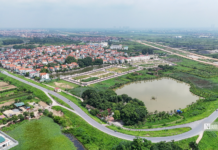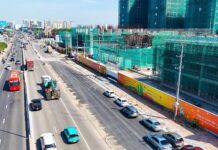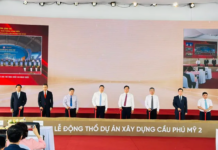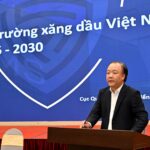8 Years in Prison for the Main Culprit
After a day of trial, on August 9, the Hanoi People’s Court sentenced Le Van Khuong (69 years old, former Chairman of the Members’ Council of COMA Corporation) to 3 years in prison, but the sentence was suspended for the crime of “Negligence causing serious consequences.”
Related to this case, the defendants Le Huy Lan (62 years old, former General Director of COMA 18) and Nguyen Xuan Phong (56 years old, former Deputy General Director) were respectively sentenced to 8 years and 5 years in prison for “Violation of regulations on the management and use of state assets, causing waste and loss.”
According to the case file, Coma 18 Joint Stock Company was established and operated since 2005 with a charter capital of more than VND 134 billion, of which the state owned 51% and was held by the Mechanical Construction Corporation (COMA). The defendant Lan was the General Director.
In 2010, the Urban Housing and Development Investment Corporation (HUD) signed a contract to transfer the VP6 infrastructure to Coma 18 to implement the project. The contract clearly stated that the land lot should not be transferred or sold to a third party during the implementation period. The Hanoi People’s Committee also approved the construction proposal for this land lot.
However, in 2013, the defendant Le Huy Lan signed a dispatch to the COMA Corporation, requesting to transfer the project, and was approved by the defendant Khuong and the members of the COMA Members’ Council. They agreed to transfer the project to Private Enterprise No. 1 of Dien Bien Province, owned by real estate mogul Le Thanh Thuan (Mường Thanh Group), with a price of no less than VND 12.9 billion.
In July of the same year, Coma 18 and Thuan’s company signed a business cooperation contract, in which Thuan’s company contributed 95% of the total investment capital, equivalent to more than VND 12.3 billion, and enjoyed 100% of the business results. The contract also stipulated that Thuan’s company was responsible for declaring and paying taxes.
When Coma 18 authorized Private Enterprise No. 1 of Dien Bien Province to implement the project, this enterprise constructed the building with 37 stories, exceeding the approved plan of 25 stories (from 138 to 840 apartments, an increase of 702 apartments) and an additional 630 m2 of land area.
In 2015, the building was put into use, and Private Enterprise No. 1 of Dien Bien Province issued VAT invoices and collected money from customers. Just a year later, Hanoi Inspectorate concluded that the land use fee for the VP6 Linh Dam project was temporarily calculated at more than VND 74.8 billion.
By 2023, the Hanoi Department of Natural Resources and Environment concluded that the actions of the COMA 18 leaders caused damage of more than VND 64.3 billion.
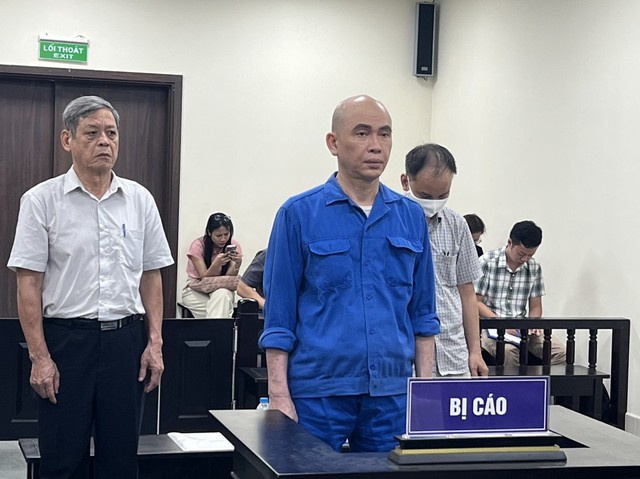
Defendant Le Huy Lan (in green) and his two accomplices.
Project Transfer Due to Fear of Land Revocation
At the trial, defendant Le Huy Lan confessed that in 2013, when Coma 18 was assigned to implement the VP6 Linh Dam project, the real estate market was extremely difficult. With the limited potential of a mechanical company like Coma 18, the defendant felt that they could not afford to implement the project.
According to Mr. Lan, if they reported to the city, the project might be revoked, which would mean that all the capital the company had invested in it would also be revoked. Moreover, the capital invested in the project was state-owned.
This situation prompted him and his colleagues to find enterprises with strong financial potential to discuss cooperation and investment. “I had to sign a business cooperation contract with Mr. Le Thanh Thuan’s company, but in essence, it was to carry out the intention of transferring the project,” Mr. Lan said.
When asked by the prosecutor whether the contract he signed was a business cooperation contract, and whether it was reasonable for the partner to contribute 95% of the capital and then enjoy 100% of the benefits, Mr. Lan replied “no.” He also denied knowing that the partner had constructed the building with more floors and apartments than permitted.
Mr. Lan’s answer was assessed by the prosecutor as “contradictory and insincere,” because in a business cooperation contract, the partner’s actions should be known to both parties…
Meanwhile, defendant Le Van Khuong described the difficulties faced by state-owned enterprises during the challenging period in the real estate market.
Mr. Khuong stated that COMA was a Mechanical Construction Corporation, and COMA 18 mainly operated in the mechanical field, not specialized in constructing apartments, and had very limited capital. They often had to borrow from banks and even borrow working capital to implement projects.
In 2013, when he became the Chairman of COMA, one of his most important tasks assigned by the Ministry of Construction was to divest state capital from projects outside the main business sector. This included the VP6 Linh Dam project, which was of great concern.
When the COMA 18 management reported that the company could not sustain the project, Mr. Khuong learned that Mr. Lan had met with many enterprises to find a way to “salvage” the project. Upon the request of the COMA 18 Board of Directors to find an external enterprise to cooperate in the project, Mr. Khuong initially only agreed to “transfer” the project, but on the same day, he supplemented the content “or cooperate in business” and signed the resolution approving it.
In this case, the prosecutor stated that the defendant Lan took the initiative in proposing and directly directing the project transfer; the defendant Phong knew it was wrong but still implemented it, becoming an accomplice; and the defendant Khuong failed to manage and monitor the project properly, allowing Thuan’s company to construct the building in violation of regulations.
Notably, up to now, many residents who bought houses in VP6 Linh Dam have not received land use certificates.
In relation to this case, during the investigation phase, real estate mogul Le Thanh Thuan stated that he did not collude with the defendant Le Huy Lan to have Coma 18 receive the VP6 Linh Dam land lot and then transfer it to his company. Instead, Mr. Lan took the initiative to contact and request to sign a contract. Thuan did not push or influence Coma 18 to transfer the project.
As there is insufficient evidence to determine the role of Mr. Le Thanh Thuan as an accomplice, the investigation agency has separated the materials for further investigation.
In addition to this case, Mr. Le Thanh Thuan is also under investigation for irregularities in the CT6 Kien Hung project (Kien Hung ward, Ha Dong district). Initially, the investigation agency determined that Thuan fraudulently sold 488 apartments and illegally profited by more than VND 480 billion.


